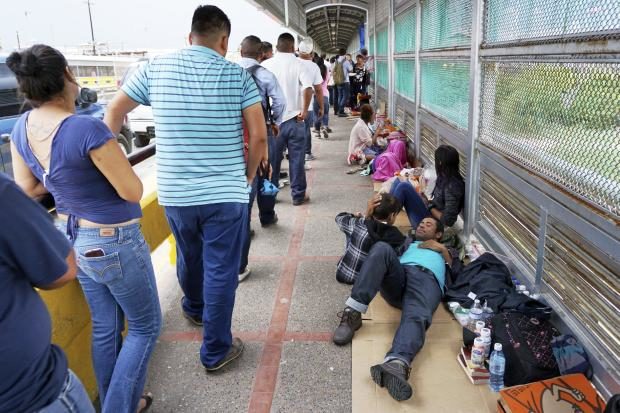In Texas border towns, illegal immigration is big business

In this photo, taken on Thursday, June 23, 2018, migrant families rest from their travels to Matamoros, Mexico, along Gateway International Bridge which connects to Brownsville, Texas, as they seek asylum in the United States. AP
EL PASO, United States – For volunteer activists working with immigrants, those who profit from the migrants’ plight are “sick.”
But illegal migration is big business in the border state of Texas, generating jobs for private prison operators, money lenders and storefront lawyers.
Texas is at the center of the immigration crisis produced by President Donald Trump’s “zero tolerance” practice, which has led to the separation of more than 2,000 children from their families who attempted to enter the country illegally or while seeking asylum.
Although Trump on Wednesday ordered an end to the separations, deep confusion lingers over what this will mean on the ground. But in the meantime, the money keeps rolling in for those who benefit from the migrant influx.
More than two-thirds of the nearly 304,000 who entered from Mexico and were detained by border patrol agents in the fiscal year 2017 were in Texas, according to US Immigration and Customs Enforcement (ICE).
Article continues after this advertisementNot surprisingly, then, Texas has the largest number of detention centers for immigrants.
Article continues after this advertisementThe Houston detention center, built in 1983, was the first privately run prison in modern US history. Its owners, CoreCivic (formerly the Corrections Corporation of America), and the GEO Group are the two largest prison corporations in the country.
Both are listed on the New York Stock Exchange.
In all, CoreCivic operates four detention centers in Texas under contract to ICE.
GEO operates three, with a fourth under construction. Each of the two corporations owns or operates more than 120 prisons nationwide.
“We are very appreciative of the continued confidence placed in our company by US Immigration and Customs Enforcement,” GEO president George Zoley said last year in a statement announcing a new federal contract worth $110 million.
According to the investigative center In The Public Interest (ITPI), privatizing the penal system creates an economic incentive to promote mass incarceration even for minor crimes, such as illegal entry.
The two corporations together “have spent more than $10 million on political candidates and have spent nearly $25 million on lobbying efforts since 1989,” according to an ITPI report.
In 2017, GEO and CoreCivic had combined revenue of about $4 billion, according to the companies’ annual reports.
Prisons for profit
“It’s an industry that drives the lobby for increased sentences, increases in mandatory minimum sentences, harsher punishment — because every day that they have somebody in a bed, you know, they’re making money,” immigration lawyer Jodi Goodwin, who works for the nonprofit Migrant Center for Human Rights, told AFP.
“It’s a sick industry.”
According to ICE, the daily average population of immigrants in detention centers in fiscal year 2017 was 30,539. This year, the number has already hit 50,379.
The current crisis has cast a harsh light on some of the private operators of shelters where children are sent after being separated from their parents or guardians by border authorities.
There are 31 shelters for children in Texas, according to the Texas Tribune. Of them, the most controversial are those of the Southwest Key Programs.
Its children’s shelters are run under contract with the Office of Refugee Resettlement (ORR), part of the US Department of Health and Human Services.
“Casa Padre,” a former Walmart store in the town of Brownsville housing some 1,400 migrants, is the largest of Southwest Key’s facilities, some of which have been accused of violations by state inspectors.
Southwest Key will receive more than $458 million from the government this year, according to Bloomberg magazine.
But privately run prisons and shelters are not the only ones profiting from the business of illegal immigration.
Immigrants pay more
“This is an industry — a rising industry,” economist William Glade, a professor emeritus at the University of Texas, told AFP.
“Considering the nature of our court system, this is a full-employment act for lawyers, and you can bet that they will cash in on the opportunity — and find ways to keep it going for a long time to come.”
It is also a “good opportunity” for others, he said.
Migration is at the epicenter of the local economies of parched and dusty Texas cities like McAllen, Hidalgo, El Paso, Laredo and Tornillo, along the inhospitable border with Mexico.
Private firms of immigration lawyers and seedy lending operations that require “only a signature” share the streets with cowboy-boot stores and fortune tellers.
Downtown El Paso is dotted with bail bonds shops, which lend money to detainees unable to pay the bail set by a judge in order to be released while their cases are being processed.
In cases of common crimes, bail bondsmen charge defendants a commission of about 10 percent the value of the bail. But in immigration cases, prices shoot up.
Lachica Bail Bonds in El Paso charges 20 percent of the value of the bail to foreigners accused of illegal entry, plus an additional $500 processing fee.
Bail for most immigrants is set at $10,000 to $15,000, “although I have one right now for $25,000,” an employee who asked not to be named told AFP.
Once immigrants are finally released, they must wear electronic ankle bracelets monitoring their location.
Those bracelets are sold to the authorities by BI Incorporated, part of the GEO Group.
Employees at its El Paso office refused to tell AFP how much the firm charges for them. /cbb